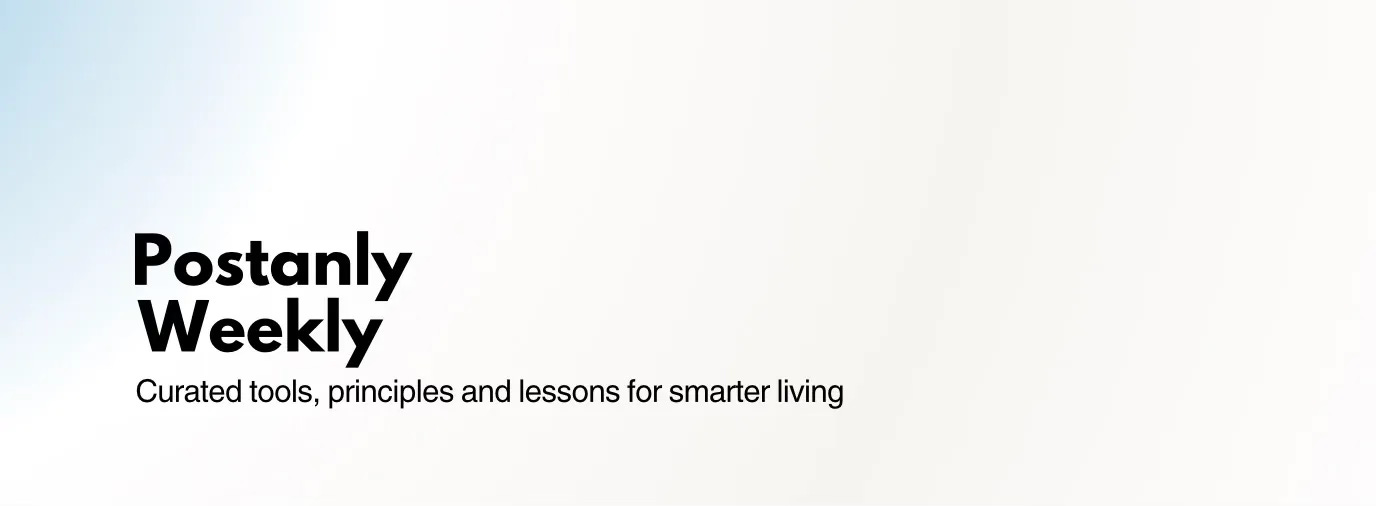Bruce Lee's “Liquid Mind” Rule For Life
The One Hidden Mindset Keeping You From Your Best Life
Hello everyone,
Postanly Weekly is a reader-supported smarter living newsletter. To support my work, you can upgrade to a paid subscription for $7 per month or $40 for an entire year. With a modest yearly contribution you’re not only helping keep Postanly Weekly going, you also get free access to Thinking Toolbox (mental models for life) and Mental Wealth Toolbox (practical concepts for smarter decisions).
In partnership with Shortform
Want to improve your reading with a nonfiction book summary app?
Shortform is one to try. Most book-summary apps just hit you with the highlights, but Shortform goes way deeper. They’ve got detailed guides that dive into the heart of the book. Plus, with thousands of titles across 30+ categories—whether you're digging into business, health, self-help, parenting, or something else entirely—they’ve got you covered. It gets better.
Shortform doesn’t stop at books. They’ve got guides for articles, podcasts, and even a browser extension that can whip up summaries for anything online. Experience a new level of understanding and personal growth with Shortform. Postanly readers get a free trial PLUS 20% discount and a FREE trial!, so you can finally dive deep into some of my favourites like:
Be Water, My Friend: Shannon Lee explores how her father championed flexibility, quick response, and balance between opposing forces.
The Way of Water: The “Liquid Mind” Rule
Bruce Lee is one of the most famous martial artists in the world, and for a good reason. Not only was he a master of his craft, but he brought it to the masses in ways other fighters never had.
In addition to being a movie star and an excellent fighter, he was also an expert at communicating his ideas. In fact, some of his quotes have gone on to become so famous that they’re used as inspiration for many today.
One such quote is about being like water.
In an interview with Pierre Berton in 1971, Lee said, “Be Water, My Friend. Empty your mind. Be formless, shapeless, like water. You put water into a cup, it becomes the cup. You put water into a bottle, it becomes the bottle. You put it into a teapot, it becomes the teapot. Now water can flow or it can crash. Be water, my friend.”
This may seem strange at first glance, but once you take a moment to think about it, you can see how this makes sense when thinking about thriving in an uncertain and chaotic world. It’s the key to thriving in any environment.
Bruce Lee’s philosophy on life is as inspiring and brilliant today as it was when he first articulated it. Be like water, he said, because that is how you must also live: fluid, adaptable, and unbound by other people’s limitations or their expectations of who you should be.
And while this idea has been expressed in different ways by other thinkers throughout history, what makes Lee’s take so unique is its application to a life of constant growth and self-improvement.
“The less effort, the faster and more powerful you will be,” says Bruce Lee.
Water is one of nature’s most dynamic elements. It’s always moving, flowing, and adapting to many situations. Water can flow, freeze, react, and absorb. It can move from a liquid to a solid or vice versa.
Water is eternally changing. This is why water is so adaptable: it responds to its surroundings. The same goes for you. You should be fluid and adaptive in your approach to everything you do — whether at work or home, in your relationship, career, finances, life experiences or personal growth.
Change, improve, or upgrade when your new situation demands it — especially when your success depends on it. “Do not pray for an easy life, pray for the strength to endure a difficult one,” Bruce Lee said.
You can thrive in any situation by constantly adapting and changing your approach. You don’t need to lock yourself into one way of thinking; you can stay open-minded and receptive to new ideas while still maintaining your core values.
Being like water also means being unpredictable, which is more powerful than predictability when it comes to influencing people’s actions.
The water principle
“Adapt what is useful, reject what is useless, and add what is specifically your own,” Bruce Lee said.
The ability to pivot in response to changing circumstances is a critical attribute for success in any field. There will always be unexpected twists in life — it’s how we react that matters most.
Almost everything in life is a mind game! When we think about how we can change and adapt to be more like water, we are talking about flexibility — an open-minded approach to life. And flexibility starts in the mind.
Henry David Thoreau also reflected on water and how it connects us.
“The life in us is like the water in the river. It may rise this year higher than man has ever known it, and flood the parched uplands; even this may be the eventful year, which will drown out all our muskrats. It was not always dry land where we dwell,” he once said.
When you are flexible, you are adaptable — your mind interprets situations in ways that allow you to keep thriving despite what life throws at you. For a more adaptable life, reflect on the relationship of water with nature; it flows freely without struggle.
As the saying goes, “Water finds its own level.”
It’s the best way to improve in any area of life. You must constantly be moving forward if you want to improve at all. Never stay still; always be growing and improving yourself every day.
Life is a series of ups and downs. When things go smoothly, it’s easy to get comfortable and expect things to stay that way. We may even start viewing that period as the new normal.
But in reality, things are always shifting. The trick is being ready for when those shifts occur and adjusting accordingly. There is no perfect balance. To be more fluid requires you to be ready for anything to keep moving.
So, be like water and flow with your natural talents, abilities, and inclinations. Be like water and allow yourself to be molded by your experiences and circumstances positively. Be like water and adapt as necessary. Be like water and be receptive to new ideas, possibilities, and opportunities. Be like water and trust your instincts.
Be like water and acknowledge that you cannot control everything that happens to you but can control how you react to it. And lastly, be like water because it moves forward even when obstacles are in its way.
Food for thought
The One Hidden Mindset Keeping You From Your Best Life [Free read on Medium]
Sometimes, we don’t just fall for one trap; we also get caught in the “anticipation fallacy,”when looking forward to something (even if it’s unattainable) can be more enjoyable than the reward itself. Anticipation and reward detach us from enjoying the process. This explains why achieving goals often feels anticlimactic. Economist and philosopher John Maynard Keynes observed the truth at the bottom of all this mentality. He called it “purposiveness: using time well for future purposes.
A concept worth understanding
Ex ante and ex post
Ex ante and ex post are Latin terms that mean "before the event" and "after the event," respectively. These terms are often used in economics and finance to distinguish between expectations and outcomes.
Ex ante thinking is about making decisions based on expectations or forecasts. For example, an investor might make an investment decision based on their expectations of the company's future performance.
Ex post thinking is about evaluating decisions based on actual outcomes. For example, an investor might evaluate the success of an investment decision based on the company's actual performance.
Examples of Ex Ante and Ex Post Thinking
Ex Ante: Before a holiday trip, you might plan your itinerary, book accommodations, and estimate travel expenses based on expectations of attractions, activities, and costs.
Ex Post: After the trip, you reflect on your actual experiences, expenses, and whether the planned itinerary matched the reality. This reflection informs future travel plans and adjustments.
Ex ante: A company invests in a new product because they expect it to be successful. Or a government implements a new policy because they expect it to improve the economy.
Ex post: The company's new product fails. The team review what went wrong and lessons they can apply in future launches. A government's new policy improves the economy after being implemented. They double down in other areas and keep doing more of what’s working.
How Ex Ante and Ex Post Thinking Can Differ
Ex ante and ex post thoughts usually vary due to doubt. During ex ante decisions, we rely on predictions and hopes, which may not be correct. Therefore, ex ante and ex post results often differ.
For instance, an investor may choose to invest believing the company's stock price will rise. Yet, if the stock price falls, the investor's ex ante choice ends up unsuccessful ex post.
The Importance of Ex Ante and Ex Post Thinking
Ex ante thinking helps us make careful choices, while ex post thinking helps us learn from those choices. Together, they improve our ability to make good decisions over time, whether in business, personal life, or any other area.
> My best newsletter recommendations
Have a look at our favourite picks → Topics covered: learning, finance, starting up, productivity, technology, career, better living, seo, venture capital and more.
Explore the complete list of newsletters
An App I’m Enjoying
Meco— Read all your awesome newsletters on a single app. Meco is a distraction-free space for reading and discovering newsletters, separate from the inbox. Add your newsletters in seconds and liberate your inbox.
Move your newsletters to a space built for reading and declutter your inbox in seconds. Enjoy newsletters in a space designed for reading. It’s a time saver for writers and newsletter readers.
Keep up with tech in 5 minutes
Love Hacker News but don’t have the time to read it every day?
Try TLDR’s free daily newsletter. TLDR covers the best tech, startup, and coding stories in a quick email that takes 5 minutes to read. No politics, sports, or weather (we promise). And it's read by over 1,250,000 people!
Subscribe for free now and you'll get our next newsletter tomorrow morning.
Thanks for reading!
Until next week,
Thomas
Medium | All Courses | The Write Life | Philosophy For Modern Life
Postanly Weekly is now a reader-supported publication. To support my work, you can upgrade to a paid subscription for $7 per month or $40 for an entire year. With a modest yearly contribution you’re not only helping keep Postanly Weekly going, you also get free access to Thinking Toolbox (mental models for life) and Mental Wealth Toolbox (practical concepts for smarter decisions).






Hi - I know he wrote about fighting, but is there a book that covers Bruce Lee's philosophy?
I have been a subscriber for a while and have followed your writing over the years on Medium. Today's post resonated. I used the Bruce Lee quote in a post two weeks ago: https://tobintrevarthen.substack.com/p/humans-in-the-loop
I bought his book years back and continuously refer to it in times of uncertainty - like this morning.